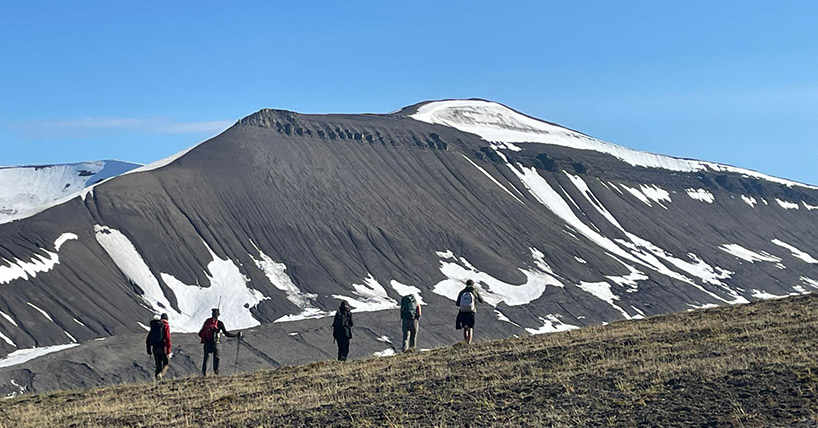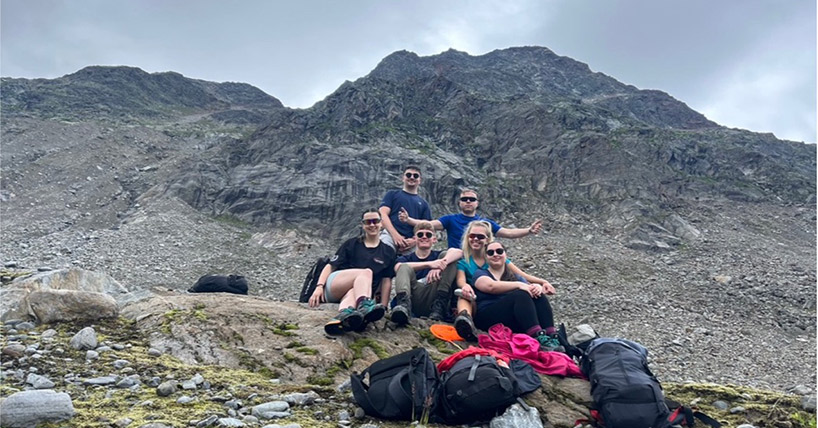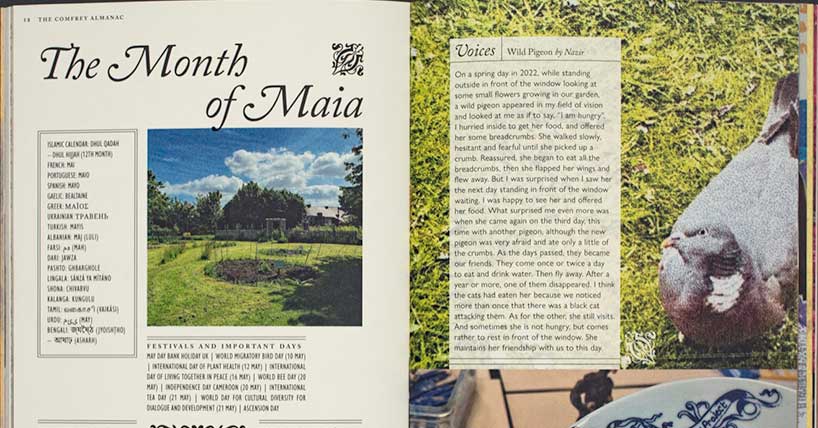student expeditions
Showcasing 75 years of student-led research expeditions
Published on: 24 November 2023
Newcastle University is celebrating the outstanding achievements of students in the field of research and independent overseas research expeditions.
The University’s annual Celebrating Research Scholarships and Expeditions public lecture on November 29 will feature student projects covering a range of research areas, from expedition students carrying out research on glaciated regions of Svalbard and the Austrian Alps, to research examining the thermal dynamics of coral reefs in Palau, investigating artistic representations of Aphrodite and Venus, and analysing the impact of poor air quality on hospitalisations of patients with multiple chronic conditions.
Presenting as part of the University’s Public Lectures Programme on 29 November, five groups of students will discuss their research projects, conducted across the world – from the Austrian Alps to Svalbard.
The event will feature diverse student projects:
- Linking thermal history and population dynamics in a common coral - This project by Biology undergraduate student Davindar Grantham explores thermal variations in Palau and their impact on Acropora digitifera coral.
- Austria expedition: Changing Glacial Environments – A team of Geography undergraduate students analysed the impact of Gepatschferner's retreat on geographical factors in the Austrian Alps.
- The Impact of Poor Air Quality on Hospitalisations of Multimorbid Patients: A Systematic Review - Pharmacy masters student Arisha Ahmed has conducted a systematic review on air pollution's impact on hospitalizations.
- Venus and the Classical Gaze: an Analysis of Provincial Depictions of the Goddess of Love – The work of Meg Warriner, an Ancient History and Archaeology undergraduate student, focuses on the artistic representations of the goddesses Aphrodite and Venus, often seen as one in the same, throughout the Greek and Roman worlds respectively.
- The warming Arctic: A case study in Svalbard – A group of undergraduate Geography students evaluate the spatial and temporal changes of the Longyear catchment and its wider region.

Research Scholarships
Newcastle University supports undergraduate students through the Research Scholarship scheme to allow them to work alongside researchers on 6-to-8-week summer projects and, through the Expeditions scheme, to help to fund students to undertake field research in other countries. Recent projects have involved researching in archives, working on archaeological material, collecting, analysing, and interpreting social data, working on a laboratory project, or travelling to another part of the world to undertake research in an unfamiliar and challenging environment.
Professor Ruth Valentine, Pro-Vice-Chancellor, Education, said: “Students are an integral part of our research culture at Newcastle University. By taking part in any research experience, students develop as independent thinkers, learn new skills and are exposed to the vibrant research culture and environment of the University.
“Independent research carried out with the support of more experienced researchers builds confidence and develops analytical skills. For some students the experience of research will stimulate or confirm an interest in postgraduate study and research, for others it will be a way to enhance their skills and experience.
“This scholarship scheme is a fantastic experience for our students and is a great opportunity for our colleagues to work with our enthusiastic and talented students in a different setting.”

75 years of student expeditions
This year’s presentation marks 75 years of student expeditions, with a long and exciting history dating back to 1948 when a small group of Geography undergraduates took part in a pioneering expedition to Iceland under the guidance of Hal Lister, a glaciologist and noted Arctic and Antarctic explorer, who took part in many expeditions including the British North Greenland (1952-1954) and Commonwealth Trans-Antarctic (1955-1958) Expeditions. Hal was an undergraduate, and later an academic, in Geography at Newcastle University. He was a strong advocate of undergraduate students gaining experience of fieldwork through expeditions and his legacy of promoting and supporting student expeditions, which now extends to all subject areas across the university, continues to this day.
Since the first expedition in 1948, subsequent expeditions have been organised and conducted by students undertaking research in more than ninety different countries, and from a wide range of disciplines from each of the three University faculties. Expeditions have been carried out in a diverse range of environments and destinations, with more recent examples including Brazil, Costa Rica, Ethiopia, Fiji, Greenland, Nepal, Peru and Tanzania. Research has been carried out on a wide range of topics including biodiversity, ethnography, territoriality and identity, nursing and medical care, ecological change, and melting glaciers.
Dr Emma Pearson, Chair of the University Expeditions Committee and Principal Research Associate at Newcastle University’s School of Geography, Politics and Sociology, said: “This year is particularly exciting as it marks 75 years since the tradition of student research expeditions began back in 1948.
“Organising an overseas expedition is a logistically challenging exercise, requiring students to develop research aims and objectives, identify study sites, learn new techniques, obtain field equipment, and liaise with research counterparts and institutions overseas. An additional challenge is that overseas expeditions require substantial funding which the students must raise themselves, including from external professional bodies and commercial sponsorship.
“The students who rise to these challenges gain a wide range of valuable skills and also benefit from team-working and leadership experience. In addition to the hugely rewarding experience that students gain throughout the whole expedition process, from initial ideas and planning through to successful completion and write-up, they always return with new skills, a huge sense of satisfaction and fulfilment, and increased confidence and maturity. I always look forward to hearing about and celebrating their exciting endeavours and achievements when they return.”
To find out more about the student research scholarships and expeditions public lecture and to register, please visit: https://www.ncl.ac.uk/events/noticeboard/item/291123celebratingstudentresearchscholarships.html



